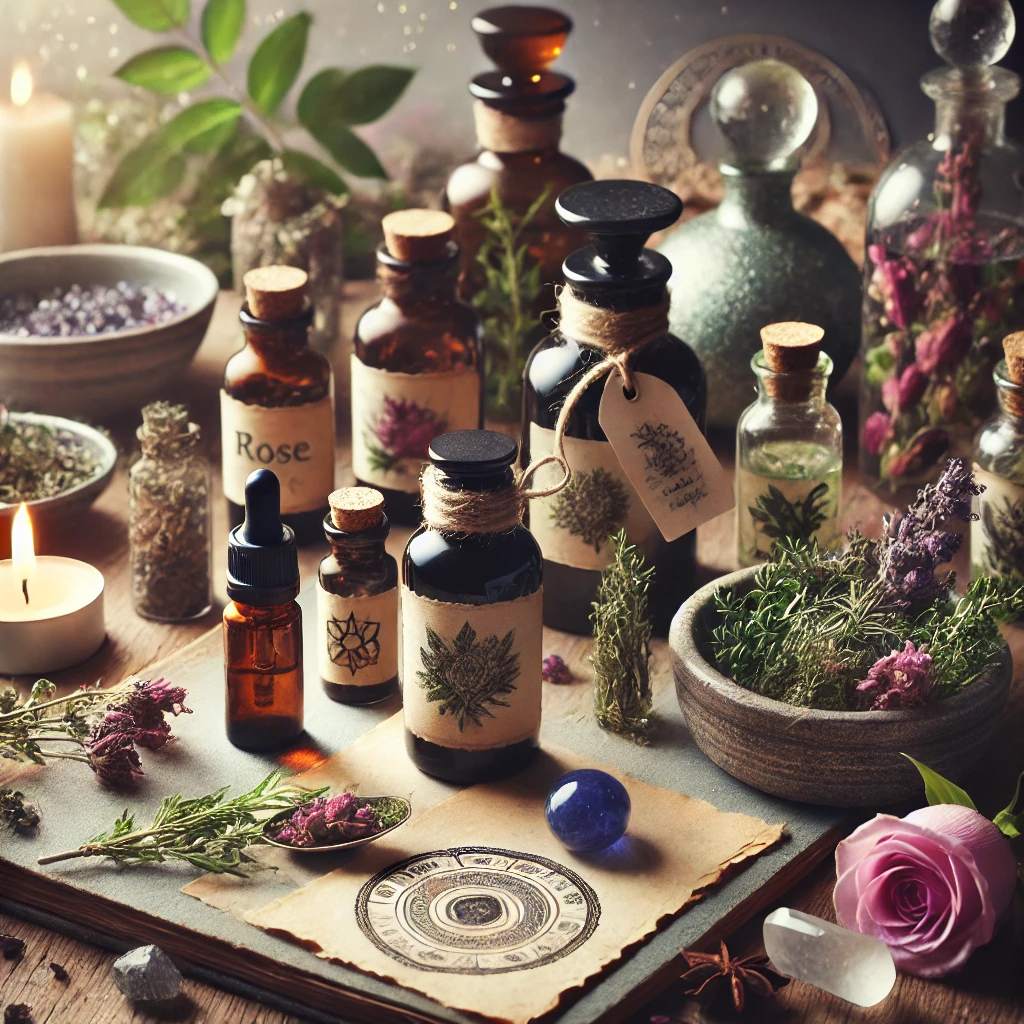Overview
Herbal tinctures are potent liquid extracts of plant medicine created by soaking herbs in alcohol, glycerin, or vinegar. They are one of the most concentrated and long-lasting forms of herbal remedies, delivering fast and effective support to the physical body while also preserving the spiritual essence of the plant.
In many traditional and spiritual healing systems, tinctures are seen as vessels of the plant’s consciousness—capturing not only the herb’s biochemical constituents but also its energetic signature. When used with intention, tinctures become powerful tools for spirit medicine, helping to shift patterns, clear energy, and awaken healing on emotional, mental, and soul levels.
What Is a Tincture?
- A tincture is an herbal extract made by macerating plant material in a solvent—most commonly alcohol, though vinegar or glycerin may also be used.
- It draws out both water-soluble and alcohol-soluble compounds, including alkaloids, resins, volatile oils, and bitters.
- Tinctures are easy to dose, long-lasting (up to 5+ years), and highly bioavailable.
Benefits of Tinctures in Herbal Practice
| Functional Benefit | Explanation |
|---|---|
| Concentrated Action | Delivers potent doses of plant constituents quickly |
| Easy to Use and Absorb | Just a few drops under the tongue or in water |
| Fast-Acting | Especially helpful in acute conditions like anxiety, infection, or pain |
| Long Shelf Life | Alcohol preserves the extract for years without refrigeration |
| Portable and Discreet | Ideal for travel, emergencies, or spiritual practice on the go |
Spirit Medicine Applications
When prepared with reverence and used intentionally, tinctures can act as soul-level medicine:
| Spiritual Use | Examples & Benefits |
|---|---|
| Aura Cleansing & Protection | Tulsi, sage, angelica, or mugwort tinctures misted or used on pulse points |
| Emotional Healing | Rose, motherwort, hawthorn for grief, heartbreak, and ancestral wounding |
| Dream & Intuition Work | Mugwort, blue lotus, and passionflower before sleep or ritual |
| Grounding & Rebuilding Energy | Ashwagandha, reishi, and eleuthero for root chakra and adrenal support |
| Chakra Balancing & Activation | Lavender for crown, ginger for root, holy basil for heart or third eye |
| Spiritual Protection & Shadow Work | Black cohosh, yarrow, or wild dagga to shield during deep work or clearing |
Creating a Tincture (Energetic + Practical)
- Choose your herb (dried or fresh, organic when possible)
- Select your solvent:
- Alcohol (vodka or brandy, 40–60%) is most common
- Glycerin for alcohol-free formulas
- Vinegar for digestive and folk blends
- Combine herb and solvent in a sterilized jar (1:5 ratio for dried herbs; 1:2 for fresh)
- Label with date, intention, and plant name
- Store in a cool, dark place and shake daily for 4–6 weeks
- Strain and store in dropper bottles
Enhance spiritual potency by:
- Adding moon water or crystal-energized water
- Placing the tincture under the full or new moon
- Infusing with prayer, mantra, or Reiki while shaking the jar
- Meditating with the plant spirit during the maceration process
Energetic & Ritual Use of Tinctures
- Anoint chakras or pulse points with spirit-led tinctures before meditation or ceremony
- Add to ritual baths or foot soaks to infuse energy directly through the skin
- Use in flower essence blends or combine with crystal elixirs
- Mist around your aura or altar space (when diluted appropriately) for energetic alignment
Examples of Herbal Spirit Tinctures by Intention
| Intention | Herbal Tinctures |
|---|---|
| Heart Healing | Rose, hawthorn, motherwort |
| Psychic Clarity | Blue lotus, tulsi, mugwort |
| Grief & Transition | Yarrow, California poppy, angelica |
| Protection | Elder, wild dagga, vervain, rosemary |
| Resilience & Vitality | Reishi, ashwagandha, schisandra, eleuthero |
| Divine Connection | Frankincense, tulsi, lavender, white lotus |
Cautions & Considerations
- Use drop-wise doses—tinctures are very concentrated
- Alcohol-based tinctures are generally not suitable for children or those avoiding alcohol unless glycerites are used
- Some herbs may be contraindicated during pregnancy, lactation, or with medications
- Be mindful of plant ethics—only use sustainably sourced or wildcrafted herbs with reverence
Related Subcategories
This topic belongs in:
- Herbal Healing Systems
- Plant Spirit Medicine
- Mind-Body-Spirit Therapies
- Energetic & Elemental Healing
- Rituals & Ceremonial Tools
Visual Element Recommendation
Suggested Visuals:
- Infographic: “How to Make a Spiritual Herbal Tincture”
- Background Image: “Tincture Bottles with Herbs, Crystals, and Candle on a Sacred Altar”
- Carousel Post: “Tinctures as Spirit Medicine: Herbal Allies for Soul Healing”

